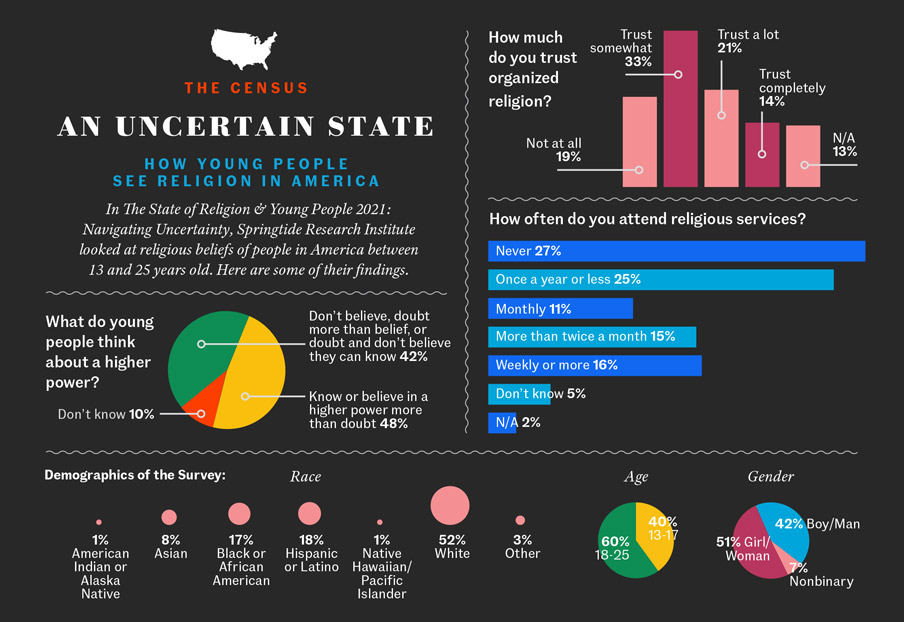
Illustration by Sol Cotti
Uncertainty and change are among the hallmarks of being young, but this past year has brought unprecedented challenges. It seems uncertainty is the air we breathe.
In The State of Religion & Young People 2021: Navigating Uncertainty, Springtide Research Institute explores the role that uncertainty plays in faith and the ways and extent to which young people dealing with uncertainty or difficulty turn to faith or religion. Spoiler alert: They don’t turn to faith communities. So, the report also explores the reasons for the disconnect between young people and religious institutions in times of uncertainty.
At Springtide Research Institute, we listen to the stories of young people, ages 13–25, and amplify their voices through quantitative and qualitative sociological research. Our work exists at the intersection of religious and human experience and strives to understand how young people make sense of an increasingly complex world. The State of Religion & Young People 2021 is Springtide’s flagship report and the product of over 10,000 surveys and a full year of research.
For theological schools, our research provides a picture of the up-and-coming generation that should be helpful in understanding how they can prepare ministers to engage with this generation.
Disconnected
Although the majority of young people Springtide surveyed consider themselves at least slightly religious (71 percent) or spiritual (78 percent), the majority of young people simply aren’t turning to religious institutions in times of difficulty. This despite the fact that these institutions across the board have rituals, beliefs, practices, and communities that aim, in part, to help humans cope with uncertainty.
Of the young people who identified as “very religious,” less than half (40 percent) said they found connecting with their faith community helpful during challenging or uncertain times; just 23 percent of those who consider themselves moderately religious found it helpful. Only 29 percent of young people who said they are actively part of a spiritual community also reached out to that community during a difficulty. One year into the pandemic, the same number of young people reported turning to “no one” (16 percent) than “someone from my faith community” (16 percent) when they felt overwhelmed and didn’t know what to do.
By and large, young people aren’t turning to religious institutions – practices, services, leaders – in times of uncertainty. And if religious leaders are trying to reach young people, the data show that they aren’t reaching them; in fact, when asked about their experience one year into the pandemic, only 10 percent said that a faith leader reached out to them personally during the year.
When asked why they don’t participate in religious practices or turn to religious communities when facing uncertain and difficult times, 39 percent told us they’ve been harmed by religion and 45 percent say they don’t feel safe when it comes to religion. This is a significant experience among today’s young people – even today’s religious young people.
“I have been exposed to people who’ve completely left the church because they’ve been hurt by it. And I’ve also visited some churches that I have really, really loved and resonated with, but I’ve also been really hurt by some. … So I’ve had a really hard time with the Christian Church,” Viola, 17, explains in discussing her experiences.
Faith Unbundled
Religious and spiritual sensibilities decoupled from particular, institutional expressions results in an “unbundled” faith.
Faith unbundled is a term to describe the dynamic combination of commitments that result when young people combine, or bundle, the elements of their faith – including their own sense of beliefs, identity, practices, and community – from a variety of religious and non-religious sources, rather than receiving all these things from a single, intact system or tradition.
More than half of young people (53 percent) say “I agree with some, but not all, of the things my religion teaches” and “I don’t feel like I need to be connected to a specific religion” (55 percent). Nearly half of all young people (47 percent) say: “I feel like I could fit in with many different religions.”
This first observation of this trend toward the “unbundling” of religious practices, beliefs, practices, and communities from one another first arose in the work of scholars Casper ter Kuile, Angie Thurston, and Sue Philips. In their report, Care of Souls, the authors write: “Unbundling is the process of separating elements of value from a single collection of offerings.” This unbundling is evident, they write, in changes to the traditional acts of meaning-making:
“Fifty years ago, most people in the United States relied on a single religious community to conduct spiritual practices, ritualize life moments, foster healing, connect to lineage, inspire morality, house transcendent experience, mark holidays, support family, serve the needy, work for justice, and – through art, song, text, and speech – tell and retell a common story to bind them together.”
Now, young people are not relying on a single religious tradition or organization to form and inform their beliefs and practices. Even young people who identify as “religious” don’t necessarily participate in religion in the traditional sense. The majority are not accepting the whole “bundle” of rituals, practices, and beliefs that religious institutions offer, mixing things from various traditions – religious and otherwise.
The Good News
We know that young people are increasingly less likely to be engaged with institutional forms of religious expression. Decades-long trends continue: Personal religiosity is increasingly decoupled from institutional expressions for a large and growing segment of young people even as they express high levels of religious belief, practice, and identity. These and other reasons start to explain why there’s a disconnect.
But there is good news: The data show a clear pathway for how to connect, build trust, and understand what young people are experiencing.
Young people’s lives are marked with an uncertainty that is best navigated relationally, an idea we studied in The State of Religion & Young People 2020: Relational Authority.
There is a significant need for trusted adults in the lives of young people to practice integrity, transparency, and listening in a season of our society so marked by social and political upheaval, failures in leadership, and broken trust. As the number of trusted adults in a young person’s life increases, research demonstrates the more likely they are to believe their lives have meaning, direction, and purpose.
To be most effective, those trusted adults need to understand and honor the new ways Gen Z is navigating questions of uncertainty; specifically, they need to understand the way young people’s religious, spiritual, and secular seeking is uniquely unbundled. Curiosity, wholeness, community, and flexibility are hallmarks of faith unbundled – the same qualities that guide young people pursuing and discerning religious questions.
Over half of young people said, “I do not like to be told answers about faith and religion, I’d rather discover my own answers” (58 percent), and that “religious communities try to fix my problem, instead of just being there for me.” Young people need relationships built on presence and listening, not advice and fixing. More than half of young people (51 percent) indicated that the most useful or important thing a person did to help them during uncertainty was to “just let me talk.”

*The numbers in the graphic are rounded and don’t add up to 100%.
Rebuilding Trust
The data show that young people will turn to trusted relationships when they have questions or concerns about how to live a meaningful life or navigate an uncertain time. Seminary leaders and educators have an opportunity to be the trusted adults that young people turn to, and to model the presence with aspiring ministry leaders that is critical to building trust with Gen Z.
Trust is low across almost every institution, and that trust has declined during the past few years of uncertainty. Rebuilding trust with young people will mean learning to respond to their doubts, questions, and experiences of uncertainty with listening and support – rather than answers or the reassurance of static certainty. Rebuilding trust will mean seeing young people’s curiosity as an asset to their religious and spiritual lives, not a liability.